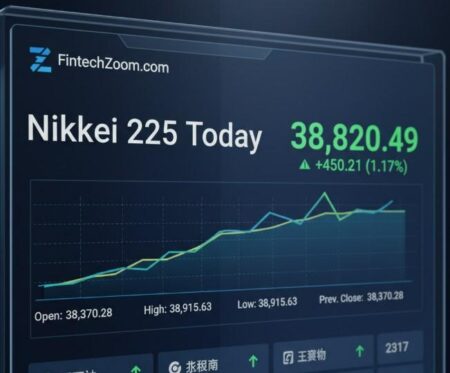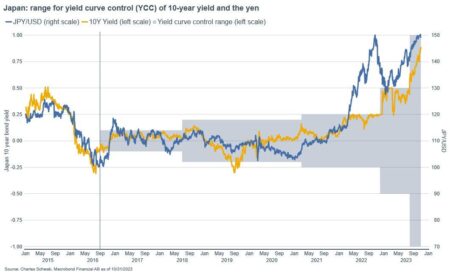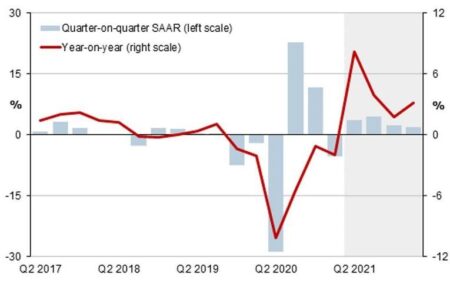Japan’s staggering $1.4 trillion foreign exchange reserves are grabbing attention as Finance Minister Sanae Takaichi embarks on a quest for new revenue sources to confront mounting economic challenges, Reuters reports
Browsing: Japanese economy
Japan’s exports are soaring, driven by strong demand for cutting-edge electronics and top-tier automobiles. However, experts warn that persistent supply chain hiccups and a slowing global market could threaten the country’s economic comeback
Japan’s 40-year government bond yields have soared beyond 4% for the first time ever, marking a dramatic spike in borrowing costs amid shifting monetary policies. This landmark moment signals a pivotal change in the country’s long-term debt outlook
Japan is swiftly establishing itself as a global titan in the ICT arena, driven by revolutionary advances in AI, 5G, and state-of-the-art digital infrastructure. As highlighted by Investments.com, these innovations are supercharging Japan’s edge in the international marketplace
Japan’s household spending dipped in April, revealing persistent softness in domestic demand as consumers remain cautious amid economic uncertainties, Bloomberg reports. This decline raises concerns about the nation’s growth momentum and its future outlook
Japan’s government has given the green light to a massive 21 trillion yen economic stimulus package, spearheaded by fiscal dove Prime Minister Takaichi. This bold move aims to spark robust growth and confront global uncertainties head-on, Kyodo News reports
Japan’s finance minister has unveiled a bold stimulus package exceeding $110 billion, aimed at sparking a powerful economic recovery amid global uncertainties, Nikkei reports. This decisive move underscores Tokyo’s unwavering commitment to fueling sustained growth, Reuters adds
The Nikkei 225 skyrocketed past the 50,000 mark for the very first time, marking a historic breakthrough in Japan’s stock market. Investors erupted with excitement, driven by strong corporate earnings and a surge of economic optimism
Japan’s Economy Minister Takaichi passionately urged the Bank of Japan to focus on achieving inflation by ensuring steady wage growth, emphasizing that boosting household income is key to powering a robust economic recovery
Japan’s average rice price has fallen for the third consecutive week, according to the latest data from nippon.com. Experts attribute this steady decline to a seasonal surplus and changing consumer tastes driving the market shift
Analysis reveals that while Takaichi’s win as Japan’s leader may delay Bank of Japan rate hikes, it won’t halt them entirely. Market watchers remain vigilant as the policy outlook stays unpredictable
Japan is gearing up to supercharge internship programs at local companies, unlocking thrilling opportunities for young people to gain real-world skills and kickstart their careers. This bold government initiative aims to bridge education and industry, offering students nationwide invaluable hands-on experience that will equip them for the future
Japan’s 10-year government bond yield soared, driven by the Bank of Japan’s surprisingly hawkish signals. This unexpected shift toward tightening has sparked a surge of market excitement on TradingView
Japan is finally shedding its long-standing resistance to price hikes as inflation rises, signaling a powerful shift in both consumer and corporate mindsets. This change marks an exciting new era for Japan’s economy, long defined by the grip of deflation
Japan’s wholesale inflation took a breather in April, easing concerns over skyrocketing prices and reducing the urgency for the Bank of Japan to hike interest rates, Reuters reports. This cooling trend could signal a shift in the future path of monetary policy
Japan is buzzing with an electrifying investing frenzy as both retail and institutional investors dive headfirst into stocks and funds. Fueled by hopes of a strong economic recovery and easing monetary policies, the market pulses with unprecedented energy and boundless optimism
Japan’s top convenience store chains are now selling government stockpiled rice straight to consumers, making a bold move to reduce surplus reserves and stabilize the domestic rice market, Kyodo News+ reports
Japan’s economy stands at a pivotal crossroads, wrestling with sluggish growth, an aging population, and relentless deflationary challenges. This compelling story uncovers how Asia’s former economic titan is fighting to reinvent itself in a rapidly changing global arena
The Bank of Japan is calling on local banks to stay alert amidst the rising tide of financial market volatility. In a recent statement, the central bank highlighted the crucial importance of enhancing risk management practices, empowering financial institutions to effectively steer through these unpredictable waters.
Japan’s 10-year government bond yield has reached its highest level since 2008, driven by investor speculation regarding potential interest rate hikes by the Bank of Japan. This shift marks a significant change in the country’s longstanding monetary policy stance.




















